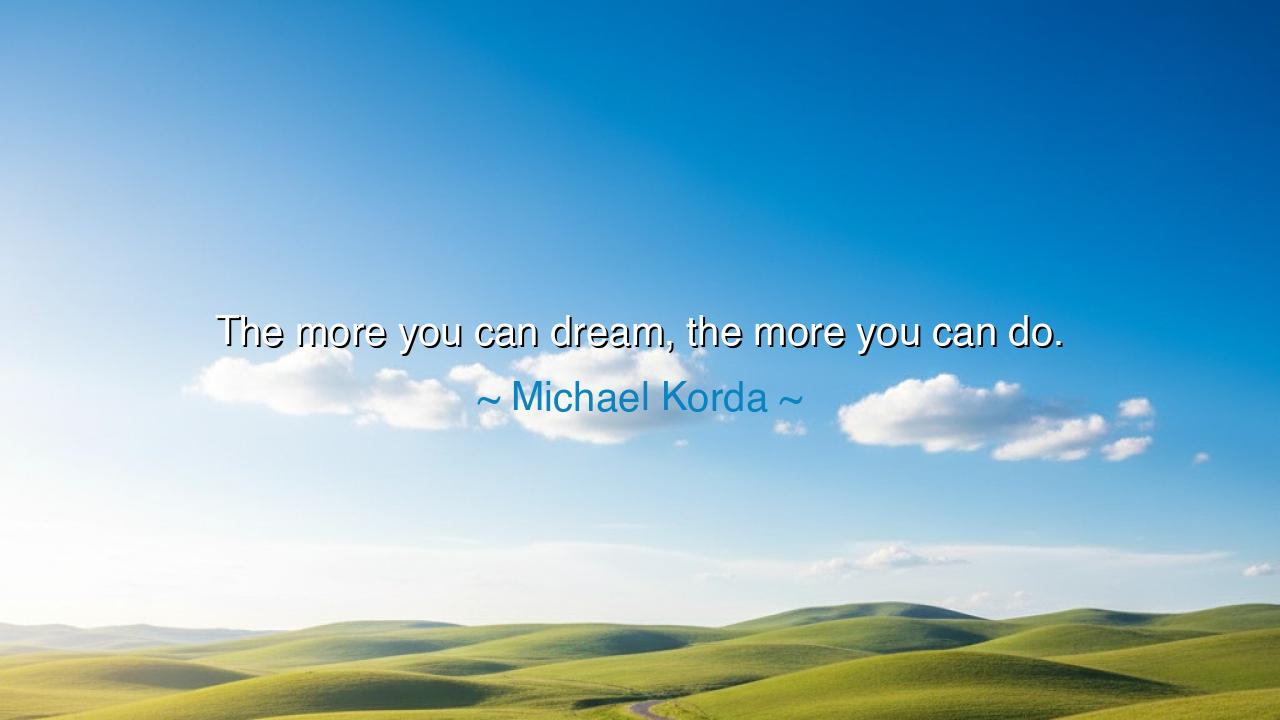
The more you can dream, the more you can do.






“The more you can dream, the more you can do.” — thus spoke Michael Korda, the editor, thinker, and chronicler of human ambition. In these few luminous words, he captures the eternal dance between imagination and action, between what is envisioned and what is achieved. To dream is not to flee reality, but to expand it; not to sleep, but to awaken the sleeping potential within the soul. For every great act, every noble creation, begins first as a whisper of the mind — an unseen image that dares to exist before the world has shaped it. Korda’s wisdom is simple yet mighty: that the measure of our doing is bound only by the measure of our dreaming.
The origin of this quote lies in Korda’s lifelong study of creativity, leadership, and human potential. As a legendary editor who worked with authors and artists of every kind, he saw that greatness did not begin in skill, nor in luck, but in vision. Those who dared to dream largely, he observed, lived largely. Their dreams were not idle fancies, but living forces that compelled them to act, to strive, to create. He understood that the dreamer is the architect of destiny — that imagination, when joined to will, becomes the engine of progress. Thus he declared: “The more you can dream, the more you can do.” It is not a call to fantasy, but a summons to possibility.
To dream, in this sense, is to see beyond what is — to behold what could be. It is the power that lifts the human spirit above its limitations and sets its course toward the unknown. Dreams are the blueprints of creation, the seeds of every empire, invention, and revolution. Yet Korda also reminds us that dreams alone are not enough. They are the beginning, not the end — the spark, not the flame. What separates the dreamer from the idle fool is the courage to act, to turn vision into motion, and hope into labor. The greater your dream, the greater your strength must become to bring it to life.
Consider the story of the Wright brothers, humble bicycle makers from Ohio, who dreamed of conquering the sky. To their neighbors, their vision was madness — men, they said, were not meant to fly. Yet Orville and Wilbur dreamed with precision; they studied, built, failed, and tried again. They believed in the unseen, and because they did, the world was changed forever. Their dream, born in obscurity, became the dawn of flight — proof that the power to do begins in the power to imagine. They did not wait for the world’s approval; they acted upon the world’s disbelief. Thus their dream did not remain a fantasy — it became a reality that lifted humanity itself.
In Korda’s words lies also a truth about courage. For to dream greatly is to risk greatly — to open oneself to doubt, to mockery, to failure. Yet those who dare to dream refuse to live as spectators. They understand that the dream itself is a kind of faith — faith that tomorrow can be better, that effort has meaning, that one person’s vision can shift the course of history. The dreamer, therefore, is not a fool, but a pioneer; not an escapist, but a creator. Every monument that stands, every bridge that spans the waters, was first a dream in someone’s mind before it touched the earth.
And yet, Korda’s teaching carries a gentle challenge: that our dreams must grow as we grow. A small dream can carry you only a small distance; a vast dream can carry you across the world. The dream expands the soul, and the soul, in turn, expands what is possible. To live without dreaming is to live without direction — to walk the earth as a shadow. But to dream deeply, and to act upon that dream, is to live as the gods intended — not merely surviving, but creating, shaping, and becoming.
So, my listener, take this wisdom into your heart. Dare to dream, but also dare to act. Do not limit your imagination to what seems likely, nor your efforts to what seems safe. The world moves forward on the strength of those who dream what others call impossible — and then rise each morning to make it real. Dream often, but work harder still; let your dreams not be cages of fantasy, but ladders to achievement.
For in the end, Michael Korda’s words remind us of the sacred bond between vision and labor. The dream gives birth to direction, and direction gives birth to destiny. The dreamer who acts becomes the doer who transforms the world. So dream boldly, act bravely, and live with the knowledge that within your imagination lies the blueprint of your future. The more you can dream, the more you can do — for the limits of your life are nothing more than the limits of your vision.






AAdministratorAdministrator
Welcome, honored guests. Please leave a comment, we will respond soon